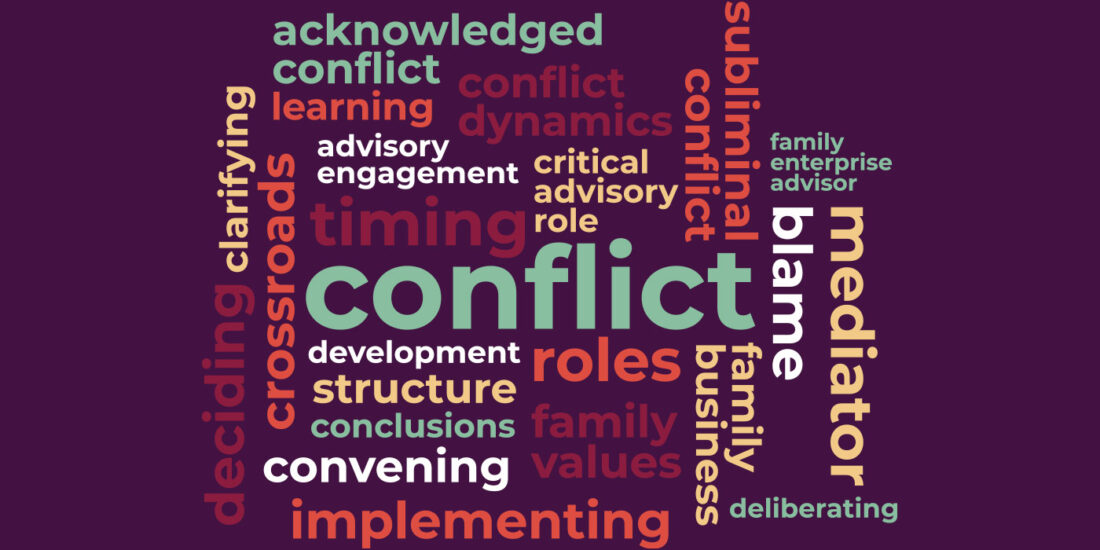Why Clients Really Call
Family business stakeholders are smart. They know their business and their family better than any consultant ever will. They may have read many of the foundational books and articles on best practices for family business. Some of these stakeholders go further and take advantage of university-based family business resource centers, join peer groups and participate in webinars and seminars. But, even though many of them are armed with well-researched information and advice, some still reach out to family business consultants. So what is it that they are looking for and, if they’ve read and heard what the experts say, why can’t they adopt and implement those best practices? This article will discuss the common motivations and underlying purpose of why many of these family business stakeholders reach out to consulting firms and how we, as advisors and consultants, can best help them.
Consultation is expensive, time consuming, often abstract in scope and deliverables, and carries no guarantee of success. Accordingly, stakeholders must be highly motivated and looking for something not easily found in the literature. When they call, they typically are circumspect, explaining that they are seeking help with one or more of the common challenges that face family enterprise: succession planning, governance development, professionalizing their business, developing leaders, etc. While this may very well be needed, we believe the reality is that these needs are likely just symptoms of the underlying cause of their discomfort.
We must reconsider the myth that the stakeholder who calls us either truly knows what he is looking for or that he is fully divulging the underlying reason for his inquiry. From my perspective, while he may honestly need succession planning or another kind of help, the underlying problem he’s grappling with, whether he perceives it this way or not, is conflict — conflict that is built into the structure of every family business system.
As we know, family business systems are inherently conflictual due to their structure of overlapping roles and responsibilities. While stakeholders may love each other and “get along fine,” conflict, even when not particularly active, to some degree is always just around the corner.
Another myth is that conflict, by definition, is active and easily identified. This is not the case. Paralysis, or being stuck, is a real form of conflict. It may even be more debilitating than active conflict because unlike active conflict, which is apparent to everyone in the system, fear of conflict prevents important decisions from being made in a timely manner and may remain ignored or avoided for decades. A stakeholder who calls looking for succession planning help may not recognize that the real challenge for his or her family is addressing the underlying conflict that prevents succession planning from evolving naturally. Stakeholders may have a very good idea of what to do, but implementation remains illusive because of the anticipated conflict that might ensue.
Many stakeholders seeking the help of family business consultants know at a gut level that conflict is just below the surface. They generally believe that acquiring some knowledge, or adopting a best practice, will help them avoid conflict. But often, even the most appropriate “best practice” can work against the interests of some of the stakeholders and eventually lead to more conflict.
Some who call are fully convinced that specific changes are needed and that these changes will likely result in family conflict. They are either seeking to displace the anger that this conflict would give rise to — away from family members and on to the consulting team – or to find a consulting team who could help identify and implement these changes while simultaneously keeping active conflict at bay.
For this reason, I find that for a significant portion of those seeking consulting services, a predominant unifying thread is “conflict management” — even when this is not specifically identified as a desired focus of the consultancy.
Another myth concerns the techniques and approaches for managing family business conflict. When stakeholders and advisors anticipate the need to address conflict in the family business system, a common reaction is to immediately turn to psychologists and/or mediators. While these approaches can be exceedingly helpful and at times essential, there are myths surrounding their applicability to managing the very specific type of conflict that exists in family enterprise.
In its purest form, mediation is facilitated negotiation. It is a process that is aimed primarily at dispute resolution. Conflict in a family business is very distinct from mere dispute. Family business conflict is systemic, built into the fabric of the system. Attempts at serially addressing individual disputes in a “whack-a-mole” strategy often create more harm than good.
Moreover, conflict in a family business is identity-based, having more in common with religious and ethnic conflict than civil disputes or so-called task-conflicts. Many of the traditional approaches developed for dispute resolution and conflict in the workplace are not effective for the kind of systemic, identity-based conflict that occurs in family business because one’s identity is not negotiable. A different, more developmental approach is required.
It should be noted, however, that many mediators view their role much more expansively, providing more developmental interventions, rather than limiting their work to helping clients negotiate disputes over money and power. Certainly, the skillsets and knowledge used in mediation are essential for conflict managers, but these skills need to be adapted to the more challenging problem of growing the family out of identity-based conflict and implementing policies and procedures to manage the ongoing systemic family business conflict.
Psychologists are often exceptional facilitators of communication among family members and business leaders. Helping family business stakeholders communicate and better understand their own motivationsand those of others are certainly valuable and needed interventions. Moreover, helping stakeholders modify their behavior and better process how they perceive themselves and others can be transformative for a family business system in conflict. However, family business stakeholders are often in conflict over very substantive business and legal issues that demand intervention by professionals who can speak with authority to these issues.
In addition, because of well-documented challenges to self-differentiation that occur within a family business system as well as other common issues such as substance abuse, narcissistic personality disorder and the stresses of ownership responsibilities, psychologists are uniquely able to provide very needed services for family business stakeholders. Unfortunately, however, when family business stakeholders are in conflict, they often do not have the luxury of time that is needed to address issues of individual psychology. Significant psychological change typically occurs in the time-scale of years, while businesses operate in the time-scale of weeks or months.
Clearly, a very specific expertise in managing family business conflict that draws on mediation skills, psychology and best business practice is needed. Conflict in a family business should be viewed within its own very specific context – identity based conflict where continuing relationships matter – and care must be taken not to simplistically apply approaches and tools which may work in civil or family conflict situations.
Conflict in a family business is extremely complex and demands a broad set of skills and understanding from professionals who would seek to manage it. The myth is that conflict management is a unique deliverable that clients may or may not request from their family business consultant. The reality is that conflict is often at the core of what motivates stakeholders to call, even though it may not be acknowledged, and its management is an essential part of implementing change in the family business system. Therefore, conflict must be considered at every stage of a family business consulting engagement – even as early as when the first call comes in.
About the contributor:
 Doug Baumoel is the founder of Continuity Family Business Consulting. An FFI Fellow, he has applied more than 20 years of business experience in developing The Conflict Equation, a process for analyzing key variables affecting family business conflict. Doug can be reached at DBaumoel@continuityfbc.com.
Doug Baumoel is the founder of Continuity Family Business Consulting. An FFI Fellow, he has applied more than 20 years of business experience in developing The Conflict Equation, a process for analyzing key variables affecting family business conflict. Doug can be reached at DBaumoel@continuityfbc.com.




